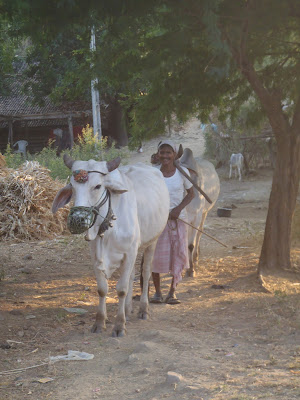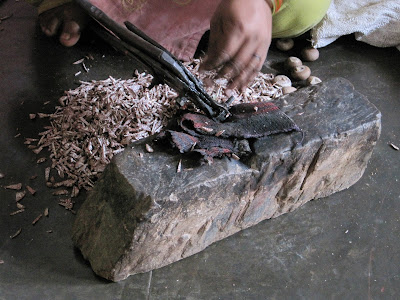Last week we had the most wonderful opportunity of being partnered with a non-government organization (NGO) of our choosing and spending a couple days “in the field” with them to learn about the development work they are undertaking. I choose to be placed with the organization “
Utthan” which means
rising. Utthan’s work ranges from development in areas of agriculture, water and sanitation, livelihood issues, gender equality and empowerment, community building, conflict transformation and peace and security – to name just a few.
 |
| Wonderful book on Utthan's history by Ashoke Chatterjee |
With our experience “in the field”, I had the great fortune of being placed in the “tribal” group which meant that myself, Meryl and Rupinder (one of my professors J) travelled out of the city of Ahmedabad to spend time with the tribal communities and Utthan offices in the countryside within the state of Gujarat. Leaving early Friday morning on what turned out to be a 4-hour drive to our destination of Limkheda, it was so nice to be able to break out of the big cities that I have been staying in and see a whole different side of India.
 |
| Glimpses from the tribal communities |
Once we arrived in Limkheda and found our way to the Utthan Tribal Office, we were oriented by Babuhai who works with the organization and were taken even further out of our little village into the countryside of India. Entering into this type of area, I was immediately floored by the change of scenery. For the first time since arriving in India, I was experiencing the great pleasure of breathing in fresh air free from pollutants, and was completely in love with our green and lush surroundings which is a pretty incredible sight considering we were in one of the driest regions in India.
 |
| Utthan's Limkheda office |
 |
| Water source for one of the tribal communities we visited |
The tribal village we visited this first day was a wonderful entry point into understanding some of the initiatives Utthan is undertaking. What makes this organization so incredible is their participatory approach to development – they are not an implementation body for the government or any other type of sector; rather, Utthan works to understand what individuals in these communities need based on what they reveal are their own priorities and then provides support to the individuals themselves to realize and develop the resources and capacities available to improve their own livelihoods and circumstances. In the particular case of the first tribal community we visited, initiatives focused on the diversification of crops, protection of land against soil erosion and deforestation, as well as assisting in the provision of a clean and consistent water source.
 |
| A pump to get water for the homes |
Having the opportunity to meet with some of the families in this small community was such an eye-opening and humbling experience. One family was gracious enough to give us a tour of their home which was quite the experience because the home we toured through was made of cement, not mud like the others, and this signified their wealth, given that it was a permanent structure, so they were very proud to be showing us and welcoming us in.
 |
| Family outside their cement home they're gracious enough to give us a tour of |
Once we returned to the village of Limkheda, Meryl, Rupinder and I, went strolling around the streets looking for some wonderful fresh fruit to stock up on for dinner. As luck would have it, we happened across some lovely pomegranates, bananas and coconuts which added a delicious and healthy staple to our plethora of candies and snacks which we considered to be our “dinner” for that evening. Given the small size of the village we were staying in, there was no hotel for us so our accommodations for the evening turned out to be the floor of the Utthan office. Until now in my trip I have been undoubtedly spoiled by the luxuries my very top-notch hotels, I now think of this night (and the outing as a whole) as one of the most divergent from my “privileged” experiences in India thus far.
 |
| Rupinder and I drinking coconut water on the side of the street in Limkheda |
 |
| Meryl thoroughly enjoying her coconut |
 |
| Our washroom for the evening at our night spent at the Utthan office |
 |
| Gujarati slumber party! |
The next day was full of profound, insightful, empowering and disturbing events. While the focus of our first day in the tribal villages was on agriculture and livelihood issues, day two exposed us to a slice of the work Utthan is doing in the area of gender equality, empowerment, conflict transformation and peace and security issues within the
Panchmahan district. In 2002, a devastating
riot broke out in Gujarat which resulted in the massacre and destruction of Muslims and communities throughout the state. The Panchmahan district was an area particularly targeted during these riots which is the reason why Utthan is now here trying to help these torn and ripped apart communities to heal and rebuild.
 |
| At the Utthan office |
 |
| Handsome cows (I come down with a bit of an obsession) |
 |
| Inside one of the homes in the tribal communities |
Since independence in India and the separation of Pakistan in the late 1940’s, there has been ongoing conflicts and struggles between Muslim and Hindu communities, in addition to the many other social divisions of caste, gender and race which further adds to hierarchical structures of power within this diverse and complex country. The riots in 2002 were an extension of these deep-seated conflicts and have shaped the present-day reality in Gujarat. At our time with Utthan, we were able to learn about some of the aftermaths which have resulted from these riots, largely thanks to Rupinder for her translations to English for the benefit of Meryl and me.
 |
| Farmer with his ginger root |
 |
| Amazing women involved with the Women's Unity Organization which is making remarkable changes for women in this area |
On Saturday, the last home we visited was that of a Muslim family who lives as a minority in a largely Hindu community. Meryl, Rupinder and I were welcomed into the home of this family, along with a woman, Sajida, who works at Utthan. Even though we have been learning about the riots of 2002 and the initiatives and work of multiple NGO’s in this area who are striving to rebuild from the destruction, it was the experience at this home that brought the realities and devastations of these events into context for me. Thanks again to Rupinder’s wonderful aid as a translator, we were able to sit with three remarkable Muslim women who shared their stories of being targets during the riots. Not only was their house burned to the ground along with all of their possessions, these women were forced to run with nothing but their baby’s and clothing on their back and hide themselves to save their lives. The truly incomprehensible atrocities that happened in this riot (particularly to women) shed some disturbing light onto what it must have been like for these women and their families during this time.
 |
| Absolutely incredible and inspiring Muslim women in her home, with her family, spending time with us while they chop their beetle-nut |
Even though some of the accounts these women spoke of were incredibly difficult to hear and make any sense of given my own personal circumstances, the fact that after only such a remarkably short time together they opened up and shared their stories with us was remarkable. Not only would it be personally difficult to talk about and bring up what must be extremely difficult memories from their past, the political atmosphere being what it still is today makes it difficult (and dangerous) for women to talk about any such abuses. The voice of these strong women sharing stories of what happened to them and to their loved ones during this time was unlike anything I have ever been witness too.
The events and riots of 2002 stemmed from a long history of conflict within this nation and can be related back, in some ways, to the work Gandhi was trying to accomplish for his people and his country. Knowing that the work of Utthan is situated within Gandhi’s philosophies of gender equity and uplifting the underprivileged, considering what we learned out “in the field” with these remarkable women, communities and Utthan staff within such a context has helped my understanding of these circumstances in a much more profound, although more complex, way.
























No comments:
Post a Comment